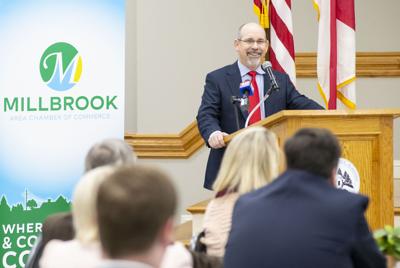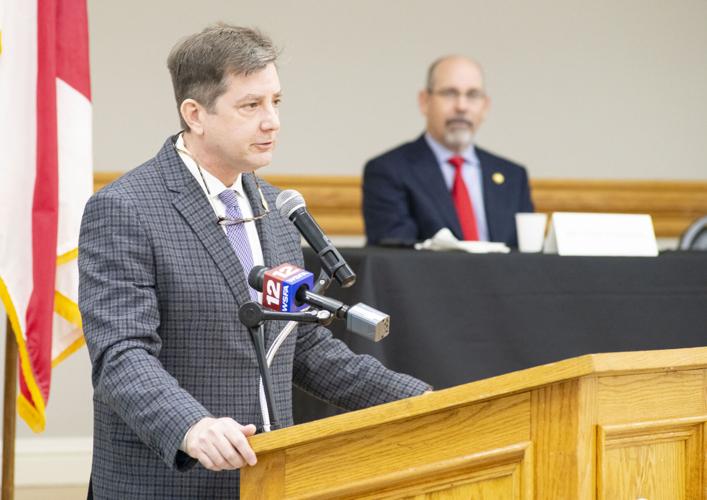Public safety and education are huge priorities for almost everyone, especially for local representatives of the Alabama legislature.
As local state senators and representatives from Elmore County are getting ready for the upcoming session, they are preparing to discuss the issues that affect growth and the safety of every area of the state. State senators Will Barfoot and Clyde Chambliss and state representatives Troy Stubbs and Jerry Starnes spoke with constituents at the annual local delegation breakfast hosted by the Millbrook Chamber of Commerce.
“Just like every session, you've got some big ticket items,” Barfoot said. “One thing I know for sure is going to be in that public safety big heading. That's a pretty broad topic.”
As the son and nephew of retired law enforcement, Barfoot hopes the legislature can aid law enforcement staffing.
“I think that there'll be a focus on trying to help municipalities and county governments around the state to recruit and retain officers,” Barfoot said. “In Elmore County, we stand behind our law enforcement officers, but I think we need to do something to make sure that they understand that we value them. We appreciate their service. They deal with a lot more than the average citizen does.”
Barfoot also expects further expansion and better definitions of types of crimes to be included under the Aniah Blanchard law that allows a quick hearing to hold in jail those arrested of certain crimes or having a certain criminal background.
Starnes worked for 25 years with the Alabama Bureau of Pardons and Parole. He too sees the need for funding for public safety.
“I've always said public safety is your biggest economic development factor,” Starnes said. “If you don't have a good, safe community you don’t have growth.”
Stanes said he is working on legislation to make parole officers state law enforcement officers and also on a bill to make the first $5,000 an Alabama National Guardsman earns from the military free of state income tax.
Gambling and gaming is another topic of discussion senators and representatives can prepare for, Barfoot said.
“Last year, we were right on the cusp of passing something for the people to vote for,” Barfoot said. “We had something that was at least palpable to send to the folks to vote for, and we were, we were a little short on that. So I suspect this year you'll see something again. This is a topic that will not go away.”
Chambliss announced proudly to the audience at the Millbrook Civic Center that neither the general fund nor the education budget had been prorated in the last 14 years. It means the funding appropriated during the session is there at the end of the fiscal year for the various state agencies. They did not have to cut previously approved budgets.
Chambliss credits a lot of the work on budgets and other matters, especially those affecting Elmore County through local legislation, to working with the other members of the local delegation.
“That doesn't mean we always agree,” Chambliss said. “We're not supposed to always agree, but we always can talk through issues and have a little bit along the way as well.”
One of the ways to work together is frequent communication and a monthly lunch to make sure everyone is up to speed on issues.
Stubbs serves on the Education Ways and Means committee in the House of Representatives. Last year he was greatly involved in the school Choose Act. This year he expects there to be great discussion over how public schools are funded. Currently they are funded on a per student basis only through the education trust fund and its foundation program.
The current funding model assumes most students are equal; however, Stubbs says they are not.
“We have students who have financial challenges. We have students who have English as a second language, special education. We also have gifted students who may not be receiving the resources that they need to improve and grow,” Stubbs said. “We're studying a student needs based formula to educate or to provide funding to educate the students in the state of Alabama.”
Stubbs said this model would increase funds allocated to STEM, arts and more.
“I do think that it will put us, our school systems, in a better position to have the funding that they need to meet the individual students' needs where that student is at, versus just counting the numbers and giving an allocation based on the numbers,” Stubbs said.
The delegation said it was aware the Elmore County Commission was working on a local bill for Enhance Elmore. As of Thursday, they all said they hadn’t seen a bill yet.
The Alabama legislature went into session Feb. 4 and will close out the regular session by May 4.



















